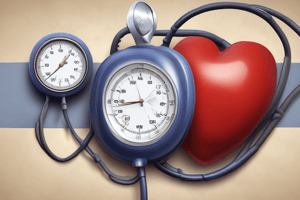Podcast
Questions and Answers
What is the physiological nervous system response to acute elevations of intracranial pressure (ICP) known as?
What is the physiological nervous system response to acute elevations of intracranial pressure (ICP) known as?
Which physician proposed the Cushing reflex in 1901?
Which physician proposed the Cushing reflex in 1901?
What is the triad associated with the Cushing reflex?
What is the triad associated with the Cushing reflex?
What is the Cushing reflex a physiological response to?
What is the Cushing reflex a physiological response to?
Signup and view all the answers
What is the definition of cerebral perfusion pressure (CPP) in the context of the Cushing reflex?
What is the definition of cerebral perfusion pressure (CPP) in the context of the Cushing reflex?
Signup and view all the answers
What are the characteristic symptoms of Cushing's triad associated with the Cushing reflex?
What are the characteristic symptoms of Cushing's triad associated with the Cushing reflex?
Signup and view all the answers
What did Dr. Harvey Cushing propose as the cause of the dramatic increase in blood pressure associated with the Cushing reflex?
What did Dr. Harvey Cushing propose as the cause of the dramatic increase in blood pressure associated with the Cushing reflex?
Signup and view all the answers
In cases of increased ICP, why does cerebral perfusion pressure (CPP) drop?
In cases of increased ICP, why does cerebral perfusion pressure (CPP) drop?
Signup and view all the answers




